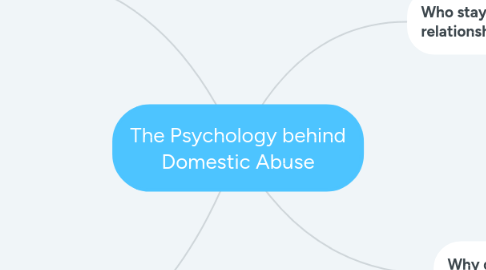
1. What is abuse?
1.1. A pattern of behavior that one may use to maintain control over an intimate partner
1.2. Abusive behaviors can range from physical to emotional to sexual
1.3. Warning Signs of Domestic Abuse
1.3.1. Mangement of all income
1.3.2. Jealousy to an extreme level
1.3.3. Isolation from friends and family
1.3.4. Controls aspects of one's life and threatens to ruin it
1.4. Types of Abuse
1.4.1. Physical Abuse
1.4.2. Emotional Abuse
1.4.3. Sexual Abuse
1.4.4. Financial Abuse
1.4.5. Digital Abuse
1.5. Types of Coercion
1.5.1. Sexual coercion
1.5.2. Reproductive coercion
2. Why do people abuse others?
2.1. Desire to get and maintain power
2.2. Enjoy the feeling of extortion
2.3. Normalized behavior for them
2.4. Stems from other mental health issues
2.4.1. Anger issues
2.4.2. Intermittent explosive disorder
2.4.3. Drug addiction
3. Who stays in abusive relationships?
3.1. Many misconceptions around who is in abusive relationships.
3.2. Anyone can be in an abusive relationship, no matter social standing or education level.
3.3. More common in younger people
3.3.1. 1.5 million high school students have experienced abuse from an intimate partner
3.3.2. College students also have high rates of domestic abuse
3.3.3. Less is known about domestic abuse at this age which allows for more of it to occur
4. Why do people feel the need to stay?
4.1. Fear of what might happen if they leave
4.1.1. Women are most like to be murdered right after leaving an abusive relationship
4.2. Not understanding what a healthy relationship is and thinking abuse is normal
4.3. The social stigma behind having to leave an abusive relationship
4.4. The love a person might feel for their abuser could stop them from leaving
4.5. Lack of money or financial stability
4.5.1. If a woman is financially dependant, she will have a hard time seperating
